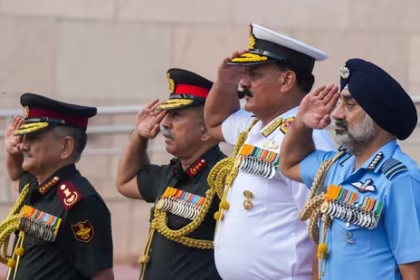Angst of an Army Veteran: Lt Gen Zameer Uddin Shah Speaks Out on Growing Communal Intolerance in India
Lt Gen Zameer Uddin Shah, former Deputy Chief of the Indian Army, has voiced his deep pain and growing concern about the state of India’s communal harmony. His words, written with clarity and conviction, reflect the rising anxiety among those who have served the country with honour and now see it being divided from within. His article is not merely an expression of personal anguish; it is a patriotic plea to restore the India that once stood as a beacon of pluralism and tolerance.
Shah begins by expressing his alignment with the thoughts penned by his brother, actor Naseeruddin Shah, who had earlier written about his fears as a Muslim in today’s India. While some dismissed Naseeruddin’s concerns as exaggerated or politically motivated, Zameer Uddin Shah confirms they are deeply rooted in reality. He explains that his brother’s piece struck a chord with him not just as family, but as a fellow Indian Muslim grappling with the shrinking space for dissent, identity, and dignity. He acknowledges that the anxiety expressed by Naseeruddin Shah resonates with many in the community who now feel like second-class citizens in their own country.
Unlike his brother, Zameer Uddin Shah comes from the apolitical and rigorously secular institution of the Indian Army. That background lends a particular weight to his concerns. In the Army, Shah says, identity is subsumed in service. Religion, caste, and region are never allowed to override the bond between soldiers. Yet, even after four decades of service, including on the battlefield and in positions of high command, he finds himself subjected to scrutiny and prejudice outside the olive green uniform.
He recounts how, despite his credentials, he has had to prove his patriotism time and again simply because of his faith. He notes with dismay that a climate of suspicion has become routine. Indian Muslims, regardless of their contributions to the nation, are increasingly seen through a lens of doubt. This erosion of trust is not only dangerous but deeply unjust, especially in a democracy that promised equality before the law and freedom of religion to all its citizens.
More painful, Shah notes, is the silence of those who should be speaking up—military veterans, public intellectuals, and people of influence who once stood for India’s secular fabric. Their reluctance to raise their voice today, he argues, contributes to the normalisation of communalism. Shah believes that silence in times of moral crisis is a betrayal of the nation’s ideals. It emboldens those who seek to divide India along religious lines and weakens the moral authority of institutions that have long upheld democratic values.
Shah does not restrict his criticism to individual actors or governments. He speaks of a larger ideological shift in Indian society—where political rhetoric is now openly communal, where mob violence often goes unpunished, and where religious minorities live under constant fear. He warns that this path is not only unethical but self-destructive. History, he reminds us, is filled with examples of nations that tore themselves apart because they let hate become policy and prejudice shape governance.
What concerns him further is how the atmosphere affects the younger generation. Muslims today, Shah fears, are growing up in an environment where they feel alienated and unaccepted. When young minds are repeatedly told they do not belong, it leads either to quiet surrender or dangerous radicalisation. Both are a threat to India’s social order and internal peace. Integration, not isolation, must be the way forward.
His article is also a defense of true nationalism—one that uplifts rather than excludes, unites rather than divides. Shah points out that nationalism cannot be owned by one religion or ideology. The Indian Constitution, which he swore to protect as an officer, enshrines the principle of secularism. To reduce Indian identity to a single faith, he argues, is to betray the very essence of the republic.
He also draws attention to the dangers of politicising the armed forces. The Indian Army, which has always remained above communal and political biases, must not be dragged into identity politics. Any attempt to use the military for sectarian propaganda could erode public trust and endanger national unity. Shah reaffirms that the military’s strength lies in its discipline, neutrality, and commitment to constitutional values—not in slogans or sectarian loyalty.
Despite his pain, Lt Gen Shah is not hopeless. His writing is a call to reclaim the moral courage that built this nation. He urges fellow veterans, fellow citizens, and especially the youth to resist hatred, speak truth to power, and uphold the values of secularism and democracy. For Shah, the India he fought for is not dead—it is just under siege. And like any soldier, he believes it can be defended, if enough people are willing to take a stand.
By bringing in the voice of his brother Naseeruddin Shah, and grounding it in his own life as a military leader and patriot, Lt Gen Zameer Uddin Shah gives us a deeply human, deeply Indian perspective. His article is a mirror held up to the country’s conscience. It asks the reader to choose: between fear and fraternity, between silence and truth, between division and unity.
In the end, Shah’s angst is not an expression of weakness—it is a demonstration of strength. It is the voice of someone who refuses to let go of hope, who refuses to accept injustice as the new normal, and who believes that India’s soul—secular, inclusive, democratic—can still be saved.
Also Read: Aralam Sanctuary Named India’s 1st Official Butterfly Species Habitat in Kerala








